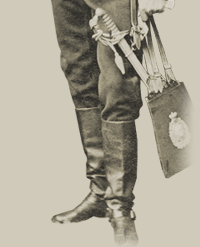

 |
|
GlossaryGlossaries have been created to provide the definition for words specific to each theme area. It is suggested that students review the glossaries before they examine a specific theme area. For example, the Ranching Glossary contains many terms such as "greenhorn," "heifer," or "wrangler," that only a rancher or cowboy might know. Ace: A military aircraft pilot who has destroyed five or more enemy aircraft. Alderman: Elected representative who is part of the governing body in a town or city. Aristocrat: A member of a ruling class or of the nobility. Artillery: Large but transportable weapons, such as cannons, howitzers, and missile launchers that are operated by crews for long range attacks. Barnstorm: To appear at county fairs and carnivals in exhibitions of stunt flying and parachute jumping. Battalion: An army unit usually consisting of a headquarters and three or more companies. Big Four: The first Calgary Stampede was held in September of 1912. A man named Guy Weadick wanted to celebrate Alberta's ranching lifestyle and traditions, but needed money for the event. Four ranchers guaranteed him $25,000 each (a great deal of money of money at the time) for what was supposed to be a one time event. These four ranchers, George Lane, Alfred Earnest Cross, Pat Burns and Archie McLean are now known as the "Big Four." Boer War: A war fought from 1899 to 1902 between the Boer governments and Great Britain in South Africa. The war was over the sovereignty and commercial rights in these lands and ended with British victory. Bootlegger: A person that makes, sells, or transports (alcoholic liquor) illegally. Brewery: A company that manufactures malt liquors such as beer and ale. Commission: An official document issued by a government giving the recipient the rank and powers of a commissioned officer in the armed forces. Discharge: An official document certifying release from the performance of an office or duty, especially in military service. Enlistment: To enter into the armed forces. Fenian Raids (1866 and 1870): During the American Civil War, Irish-Americans in the Union army began to organize themselves with the intention to invade Canada and overthrow English rule. The Canadian militia had had time to organize and the Fenians were repelled. Infantry: The branch of an army made up of units trained to fight on foot and march. Klondike: A region of the Yukon Territory around the Klondike River. Gold was discovered in 1896, leading to the gold rush of 1897-98. Maverick: There are two main definitions.
Militia: An army composed of ordinary citizens rather than professional soldiers that is usually only called into service in times of emergency. Nitro-glycerine: A thick, pale yellow liquid that is explosive when bumped around or from exposure to sudden heat. It is used in the production of dynamite. Pioneer: A person or family that ventures into unknown territory to settle. Red Cross: An international organization that cares for the wounded, sick, and homeless during wartime and now also following natural disasters. Regiment: A military unit of ground troops composed of at least two battalions. Soiree: A party of people assembled in the evening, usually at a private home. Squadron: A basic air force tactical unit. Upper Canada: In 1791 Britain divided its property in North America into two parts and named them Upper Canada and Lower Canada. Most of the people in Upper Canada were English speaking. In 1867 at Confederation Upper Canada became the province of Ontario. |
![]()
Mavericks Home
| Student Resources Home |
Teacher Resources
Contact
| Site Map | Credits
© Copyright Glenbow Museum, 2006. All Rights Reserved
